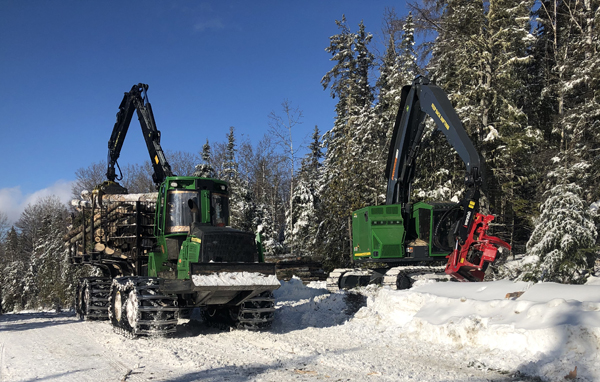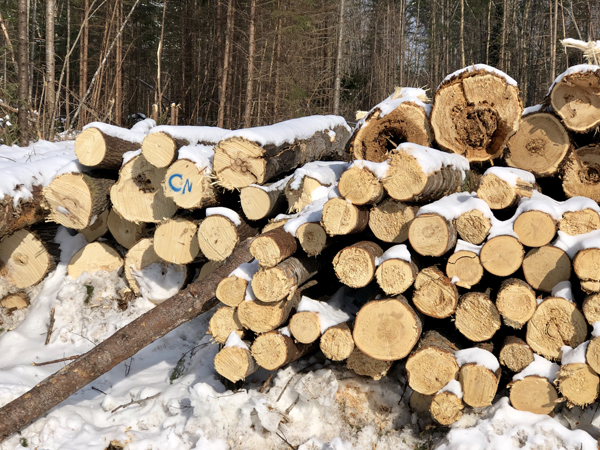 Deep in the forest of northern Maine sit two rusting locomotives, seemingly frozen in time. They offer a glimpse of a booming lumber industry that used to employ thousands of Mainers, and was lucrative enough to build a railroad system in what many would refer to as “the middle of nowhere.”
Deep in the forest of northern Maine sit two rusting locomotives, seemingly frozen in time. They offer a glimpse of a booming lumber industry that used to employ thousands of Mainers, and was lucrative enough to build a railroad system in what many would refer to as “the middle of nowhere.”
Time seems to have forgotten these two rusting dinosaurs. In a way, the same can be said for the hundreds of people who forest the very same land today.
The North Maine Woods consists of 3.5 million acres of commercial forest where landowners — private, state and corporate — work together to process the timber in a sustainable manner. It provides Maine with a $8.5 billion forest products industry.
Landowners hire contractors to harvest, process and haul the timber to sawmills located throughout the state. These contractors and the people who work for them are the heart of the workforce for the Maine logging industry, and are some of the hardest working men — and a few women — you’ll ever meet. They brave the elements and the vastness of the North Maine Woods to make a living for their families.
For 10 months out of the year they cut, process and haul timber to supply the country’s wood, paper and pulp industry. The only break is the mud season in early spring, when trucks are unable to use the logging roads. To ensure good roads for the next cutting season, the ground must be completely thawed before they can be graded.
Bordered by Canada to the north and west, the vastness of this area is hard to wrap your head around. There are no towns, restaurants, gas stations, rest stops or cell service. The blue-collar men and women who work up there use
radios and satellite phones to communicate.
It’s not a nine-to-five job. The few employed by contractors operating equipment that runs around the clock work 12-hour shifts. For most who are contractors themselves, they put in 16 to 20 hour days. That doesn’t include the hour or more drive back to the logging camp where they spend nights throughout the week — away from their families.
Most work in the woods Monday through Thursday, then spend Friday doing maintenance on their equipment, preparing it for the week ahead.
You won’t hear any complaints about the hours or difficulty of the labor from anyone up here. As a matter of fact, no one seems to think there is anything special about it. When in reality, the work ethic of the loggers in the North Maine Woods is anything but ordinary.
With the long hours and treacherous work, one could easily assume they are well compensated. Unfortunately, that isn’t always the case.
 Stacey Kelly, 55, went to work in the woods right out of high school. He drives for a contractor hauling timber with a tractor-trailer.
Stacey Kelly, 55, went to work in the woods right out of high school. He drives for a contractor hauling timber with a tractor-trailer.
“I don’t know anybody who has ever worked in the woods that would tell you that it hasn’t always been a struggle,” said Kelly. “The first guy to put an axe into a tree up here got screwed, and it’s really never stopped.”
Kelly has left the industry a few times during his career, but has always returned because he didn’t like traveling out of state for work. He now considers himself semi-retired, although most weeks he still puts in nearly 60 hours.
Things were so bad in 1998, Kelly, along with now Maine State Senate President Troy Jackson, Hilton Hafford and dozens of others, blocked the road to the Quebec border. They were tired of low pay and Canadian loggers making 50 percent more due to the exchange rate.
After a weeklong blockade and the threat of arrest, the groups dispersed and went back to work. Some logger received increased rates, but not those who started the trouble. Landowners have always found a way to divide the group for their own benefit.
Logger Jim Desjardins has worked in just about every capacity in the industry. He started back in the days of chainsaws and cable skidders. Desjardins currently works with his father and brother harvesting private lots.
The business model the Desjardins use differs a little from those who contract cut for the landowners. They buy the rights to harvest the land and the wood on it. They then sell that wood to the mills directly.
“It has its ups and downs. Last summer it was rough,” said Desjardins.
The corporate landowners have the power to drive down the price of wood in the area. If they aren’t paying the contractors a good rate on their wood, it affects the price the mills are willing to pay the Desjardins for their harvest.
Desjardins shares the sentiment of many others — the industry is at a tipping point.
“Even without bad luck and breakdowns, at the end of the month the payments on equipment are getting bigger, and the pile of wood is getting smaller,” said Desjardins.
“The wood is getting harder and harder to get out on company land.”
Dana Gardner has been driving a log truck since 1995. He’s seen the fluctuations in the industry and believes these are the worst of times. When the 2016 season started, rates were cut by at least 50-70 percent. Landowners cited a dip in the market, especially hardwood pulp.
“At first everybody was up in arms,” said Gardner. “But once the dust settled, they all just accepted it and kept on working.”
Gardner, a diabetic, had to have an operation to remove his pinky toe and part of his foot.
“I had to park my truck at a crucial time in February,” said Gardner. “There wasn’t enough money in the rates to hire a
driver. They were trying to get all the lumber out of the woods because spring was coming, but I had to give it up because of my foot. They were going to take half my leg.”
The Gardners leveraged the equity in their personal vehicles to make truck and trailer payments.
Gardner took the much-needed time off to address his foot problem. That spring he went back to the trucking supervisor and let him know he was ready to haul again.
He was told the corporate landowner he contracted with, J.D. Irving, wasn’t hiring anyone back who didn’t finish the run. The excuse: they wanted workers on which they could count.
Gardner pleaded. The words that came next will never leave Gardner’s mind:
“Well, you haven’t suffered enough, yet.”
Gardner was forced to contract with different landowners to make a living.
Dana’s foot didn’t heal as doctors had hoped, and he now makes the 8-hour round-trip drive to Bangor twice a week for wound care. With Gardner unable to put in the necessary hours hauling lumber, and not enough money in the rates to hire a driver, the family lost their business along with their vehicles.
“You work so hard to get in a position where you’re doing well,” said Gardner. “Then the bank comes and takes your truck and parks it right downtown, crossways in its front lawn for everybody to see. Right next to your wife’s Tahoe and your pickup. It’s pretty hard to swallow.”
SOMETHING HAS TO CHANGE
Maine Senate President Troy Jackson is a fifth-generation logger. During his time in the industry, he’s done everything within the limits of the law to make life better for the men and women who work in the North Maine Woods. He realized the law had to change.
Maine loggers are classified as independent contractors, barred from any attempts to coordinate with one another about their contracts. The state considers it price-fixing under federal anti-trust laws. It has kept loggers from unionizing and collectively bargaining rates and working conditions.
“I kept watching how the Machinists were helping the lobstermen and what they were doing,” said Jackson. “I thought there might be some way for them to help.”
Jackson and some other loggers reached out.
In October 2018, a group of loggers attended a class at the IAM’s William W. Winpisinger Center to discuss how to improve life for this group of workers. It was during this time they realized they needed to get the loggers added as an exemption to the anti-trust law.
Jackson and others jumped into action, writing LD 1459, an act that would expand the exemption to the “harvesters and haulers of forest products.”
It was going to be a tough lift to get them to come down to Augusta, the state capital, to testify before the hearing. Not only would they be missing a day or two of work, they would also be exposing themselves to the landowners who
sign their paychecks.
In the end, dozens of loggers attended the hearing to support changing the law.
The loggers were successful in their efforts to pass LD 1459 — adding their profession to the list of Maine industries that are exempt from the anti-trust law. The exemption took effect September 19, 2019.
“Now everyone can get together and say ‘Hey, I’m not making it,’ and now they can discuss ways to change it,” said Kelly, who attended and spoke at the hearing.
WHERE TO GO FROM HERE
 Just as the Maine Lobstermen did before them, the loggers are quickly learning how uniting together can help a group of independent workers. Many have filed paperwork to start the New
Just as the Maine Lobstermen did before them, the loggers are quickly learning how uniting together can help a group of independent workers. Many have filed paperwork to start the New
England Logger’s Cooperative and have elected Jackson as its first president.
“We’ve changed the law, we have people who aren’t afraid to push back against these guys. And [with the Machinists] we have people in the room that have experience dealing with big corporations and know what they’re doing,” said Jackson.
The loggers are exploring the many ways the New England Logger’s Cooperative can improve the lives of those who make their living from harvesting the forest products of northern Maine. They are looking for ways to
use group purchasing to lower costs for everyone. There are many areas where this could help; from parts and lubrication for their equipment and trucks to operating insurance for their businesses.
By joining together and getting LD 1459 passed, the group has already proven that through solidarity they are capable of changing the industry.
There has never been more money in the Maine logging industry than there is today, and never has less of that money gone to the people doing the work. Now, those working people have an opportunity to change that.
AH

The post Sustaining a Way of Life appeared first on IAMAW.
